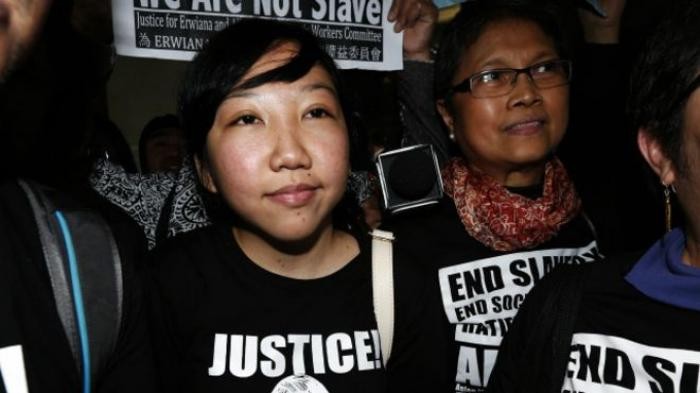Women's group demands better protection of migrant workers
Change Size
 Erwiana, an Indonesian migrant worker who suffered abuse by her employer in Hong Kong, speaks to journalists. Solidaritas Perempuan (Women's Solidarity) has called for better protection of Indonesian migrant workers. (Tribunnews.com/-)
Erwiana, an Indonesian migrant worker who suffered abuse by her employer in Hong Kong, speaks to journalists. Solidaritas Perempuan (Women's Solidarity) has called for better protection of Indonesian migrant workers. (Tribunnews.com/-)
W
omen's NGO Solidaritas Perempuan (Women's Solidarity) has urged the government and the House of Representatives (DPR) to do more to protect Indonesian workers abroad and to include vocational training in the protection of Indonesian migrant workers bill.
According to Solidaritas Perempuan program coordinator Nisaa Yuraonly, the bill, currently under deliberation and the House, focuses overly on the technicalities of the placement of Indonesian migrant workers abroad.
A focus shift is vital, Nisaa said, because Indonesians working abroad, especially in the Middle East, are vulnerable to violence, human trafficking and criminalization.
"Out of the bill's 104 articles, only eight address protection. Most of the rest address technical procedures regarding the placement [of migrant workers]," she told journalists at a discussion on migrant worker protection on Thursday.
The bill is to replace a 2004 law on the same matter, which has been criticized by migrant workers and activists for failing to address protection and seeing workers only as commodities.
Solidaritas Perempuan proposes an integrated national database system for migrant workers, containing details on workers starting from their personal data up to their placement abroad.
The group also called on the government to take over the training programs from migrant workers placement agencies (PJTKI).
"If the private sector handles the [training programs], their paradigm is to make a profit. As a result, too many migrant workers aren't trained, but they still acquire certificates and are send abroad. The supplier agencies get money [from it]," Nisaa said as quoted by tribunnews.com.
Cases of violence against Indonesian migrant workers increase every year, Nisaa added, noting that the group had received at least 50 reports of human trafficking and violence among migrant workers, with many yet to be resolved.
One of the victims was Nani Suryani, a 20-year-old Indonesian from Karawang, West Java, who worked as a domestic worker in Saudi Arabia. She was murdered by her employer in 2011.
Amin, Nani's brother, said in the discussion that the relatives had not yet received her unpaid wages and blood money from her former employers.
Around 1,503,000 workers of a total of 6.5 million migrant workers working overseas were subject to human rights violations by the end of 2014, according to data from Migrant Care. (sha/rin)









